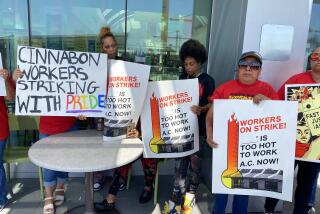Ex-Red Onion Official Testifies to Racial Exclusion Policy
- Share via
A woman who once managed a Red Onion restaurant testified Tuesday that company policy called for excluding minority patrons in 1983-85.
The testimony by Jeannie Elizabeth MacKay came Tuesday in the trial of a lawsuit in which the 14-restaurant chain has been accused of racial discrimination.
MacKay was the highest-ranking Onion International Inc. employee to testify during the Orange County Superior Court trial that her former employer enforced policies designed to limit the numbers of blacks, Latinos and other minorities in the restaurants.
Red Onion President Ronald Newman has flatly denied the allegations. Restaurant attorney Larry C. Hart said other officers of the firm support Newman.
The lawsuit was filed by six Iranians immigrants living in Southern California. They said they were repeatedly denied admission to the Red Onion restaurant in Santa Ana in 1986 because of their national origin.
MacKay worked as a bar manager in the Beverly Hills Red Onion restaurant and was promoted to general manager of the Palm Desert Red Onion. She left the restaurant chain voluntarily.
She was trained to limit the number of minorities allowed in the restaurants, MacKay testified. The tactics were to refuse to accept identification or to enforce dress codes selectively, she testified.
Asked by R. Richard Farnell, lawyer for the plaintiffs, what she was told to do, MacKay testified: “When you’re standing at the door, you can ask any question you want. You can decide that the identification doesn’t look right and keep asking for more.”
Farnell finished presenting his case Tuesday. Hart said he expects his half of the trial to last five to 10 days.
Other witnesses testifying Tuesday included:
- Gregory McFall, a busboy and later bartender who worked at Onion International restaurants in Fullerton and Long Beach.
McFall said he understood from superiors in the restaurants that the policy was to exclude minorities. He said he regularly heard managers use racial epithets when referring to blacks and other minorities.
As a bartender, McFall said, he was once ordered to harass a black patron by insisting on seeing identification every time she bought a drink. The purpose, he said, was to drive her out.
- A black police officer, Roger Sutton, testified he was twice denied admission to the Red Onion restaurant in Riverside, even though he was on police business.
Sutton said that twice last year he was assigned to check the restaurant for compliance with state drinking-age laws. He said he wore plain clothes but was accompanied by a uniformed officer.
Twice he was denied admission, he testified. Sutton said he had to show his badge to get in.
The testimony from throughout the chain represented an important tactical victory for Farnell. Red Onion lawyers had objected to any testimony except that concerning practices at the Santa Ana restaurant.
But Farnell argued that other witnesses could show that discriminatory policy and acts existed throughout the chain, and Judge Richard Luesebrink agreed.
Red Onion lawyers have denied the allegations of discrimination and said the restaurant’s policy of ensuring that no under-age customers are admitted applied to everyone.
76 People Filed Complaints
Charges of racial discrimination against the chain were the subject of widespread publicity last year.
Seventy-six people filed complaints with the state, alleging that they were refused admission to Onion International restaurants for reasons of race or national origin. Onion International Inc. paid total damages of $32,000 to settle those complaints, which were filed with the state Department of Fair Employment and Housing.
In settling the claims, Onion International did not acknowledge liability.
The chain also revised hiring and training procedures last year, a decision described by company officials as designed to correct the “perception of a problem.”
Under the terms of settlement, the state will monitor the restaurant through 1988.
The plaintiffs in the lawsuit now on trial are Maziar Mafi of El Toro; Saeid Marashi, 27, of Fullerton; Behrooz Kholocci, 31, of Fullerton; Ali Reza Mirhosseini, 22; Sayed Jalaleddin Mirrafati of Huntington Beach, and Sayed Jalil Mirrafati of Anaheim.
Farnell has asked for unspecified damages. Most of those who received money through the Department of Fair Employment and Housing each received about $500. Last January, the plaintiffs offered to settle the lawsuit for $14,999 each.
At least two other lawsuits alleging discrimination are on file against Onion International.
More to Read
Inside the business of entertainment
The Wide Shot brings you news, analysis and insights on everything from streaming wars to production — and what it all means for the future.
You may occasionally receive promotional content from the Los Angeles Times.










